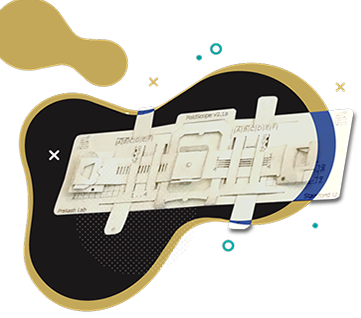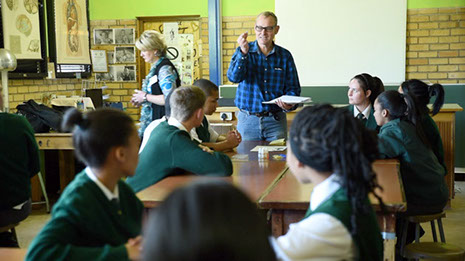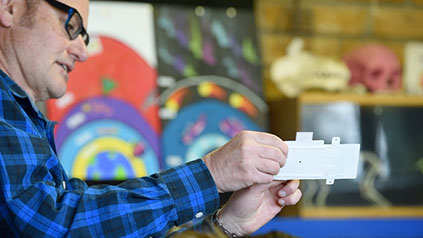![]() PHETLHOLELA KWA TLASE
PHETLHOLELA KWA TLASE
DIMAEKORO-SEKOPO
Yunibesiti ya Bokone-Bophirima e thusa go tlisa bonetetsi jo bo jesang kgakge mo diphaposiborutelong tsa metseselegae. Ka babatlisisi ba ba nnang le seabe mo porojeke ya “Teachers without borders” (“Barutabana ba ba sa thijweng ke melelwane”), dimaekerosekopo tse di fetang 3000 di abetswe dikolo kwa Bokone-Bophirima, Limpopo, Kapa Bokone le Gauteng.


tse di menwang di tlisa bonetetsi jo bo ‘jesang kgakge’ mo diphaposiborutelong
These microscopes – called the Stanford foldscopes – are an inexpensive way to empower learners to do scientific research. Each unit costs R30, which is a highly affordable alternative to conventional microscopes, which most schools cannot afford.
Each foldscope consists of a microscope lens mounted on a cardboard body. It can be easily assembled even by very young learners, and brings fun and practical experience into the classroom. Learners can investigate anything from water to plants and insects through the lenses.
Learners can even use their phones to take photos through the lenses and post the images in an app so that learners from other provinces, and even countries abroad, can also share their pictures.
“It is a wonderful instrument for them to not only discover, but also share and discuss their findings,” says Prof Josef de Beer, research professor at the School for Natural Sciences and Technology for Education, and researcher in the research focus area Self-Directed Learning.
Becoming a flagship project
The full title of the project is "Teachers without borders: Creating indigenous knowledge science labs in rural schools". Conceived in 2016, the project has taken off since the Carl and Emily Fuchs Foundation made it one of their 50th anniversary flagship projects by providing a lot of the funding for it.
“There are three major challenges in providing children with quality science education. This project aims to help teachers to overcome these,” Prof Josef says.
These hurdles are underqualified science and mathematics teachers, schools that are not equipped to nurture inquiry-based learning due to a lack of effective laboratories, and a science and mathematics curriculum that does not always show learners the relevance of science in society.
Implementing indigenous knowledge
The Teachers without borders project entails more than just the foldscopes. Researchers are also developing resource packs for mathematics, natural sciences and technology. This includes indigenous knowledge games that will simplify the teaching of many of the concepts in the mathematics and natural sciences curriculum.
Lecturers also present various cycles of short learning programmes (SLPs) for science, mathematics and technology teachers. A strong focus of these SLPs is to foster self-directed learning in teachers and learners.
*Three lucky readers can each win a Stanford foldscope. To enter the lucky draw, send an email to willie.duplessis@nwu.ac.za before 7 August 2019.
Dimaekerosekopo tse di menwang di tlhamilwe ke Manu Prakash wa Laboratori ya Prakash kwa Yunibesiting ya Stanford. Bidio e e fa godimo e bontsha ka fa dimaekerosekopo tse di menwang di dirisiwang ka gone mo dikolong tsa Aforikaborwa.

Josef, yo gape e leng mmatlisisi mo lefelong la patlisiso la Go Ithuta ka Nosi, o tlhalosetsa setlhopha sa barutwana ba Hoërskool Calvinia kwa Kapa Bokone gore dimaekerosekopo tse di menwang di ka dirisediwa go dira patlisiso ka isagwe. O na le morutabana wa Disaense tsa Botshelo e leng Marlize Huisamen.

Mop Josef de Beer wa Sekolo sa Sekolo sa Disaense tsa Tlhago le Thekenoloji ya Thuto a re dimaekerosekopo tse di menwang tsa Stanford di kgontsha barutwana go ribolola dikgakgamatso tsa saense le go tlotlelana diphitlhelelo tsa bone.
![]() PHETLHOLELA KWA TLASE
PHETLHOLELA KWA TLASE
![]() PHETLHOLELA KWA TLASE
PHETLHOLELA KWA TLASE
